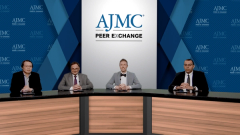
Rationale for MEK Inhibitors and Surgery
Panelists discuss how MEK inhibitors, such as trametinib and selumetinib, are emerging as first-line treatments for symptomatic NF1-associated plexiform neurofibromas, especially in progressive or inoperable cases, while emphasizing the importance of surgical resection, pain management, physical therapy, and psychosocial support for improving quality of life.
Episodes in this series

Summary for Physicians
First-Line Therapies for Symptomatic Plexiform Neurofibromas (NF1-PN)
For symptomatic neurofibromatosis type 1–associated plexiform neurofibromas (NF1-PN), MEK inhibitors (eg, trametinib, selumetinib) are emerging as first-line treatments, particularly for patients with progressive or inoperable tumors. These targeted therapies inhibit the MAPK/ERK pathway, addressing the underlying molecular dysfunction in NF1. Surgical resection remains a cornerstone of treatment for accessible and resectable tumors, aimed at relieving symptoms like pain, disfigurement, and functional impairment.
Additional Considerations
Symptomatic management, including pain control (eg, NSAIDs, opioids), physical therapy, and psychosocial support, is also important for improving patient quality of life.
Newsletter
Stay ahead of policy, cost, and value—subscribe to AJMC for expert insights at the intersection of clinical care and health economics.








